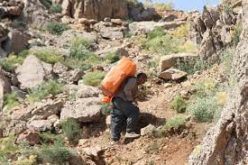Al-monitor – When the website of late Ayatollah Hussein Ali Montazeri posted an audio recording of his objections to the execution of thousands of people, mostly members of the Mujahedeen-e-Khalq (MEK) in the late 1980s, it revealed little new information beyond what had been printed in Montazeri’s autobiography. One thing the recording does confirm, however, is the identities of the individuals involved in carrying out the executions, some of whom hold important positions in the Islamic Republic today.
AUTHOR
Arash Karami
No one has more vociferously defended their actions from that time than Justice Minister Mostafa Pourmohammadi, who was the Intelligence Ministry’s representative at Evin Prison when the executions took place. Pourmohammadi and three other individuals were in charge of the committee that oversaw the executions. Using the religiously charged term “hypocrites” to refer to MEK members, Pourmohammadi told reporters Aug. 28, “You cannot show mercy to the hypocrites, because if they can bloody and soil you, they will.” He added, “We take pride in executing the orders with respect to the hypocrites.”
The name of Assembly of Experts member Ayatollah Mohammad Reyshahri, who headed the Intelligence Ministry during the executions, is not heard in the audio recording. Nonetheless, Reyshahri condemned the release of the audio file, charging that the people behind it were trying to whitewash the image of the MEK at a time when the MEK is aligning with Iran’s regional rival, Saudi Arabia. He accused the people formerly in Montazeri’s inner circle of either having a relationship with the MEK or having been penetrated by them.
Montazeri’s son Ahmad, who was behind making the audio file public, has not provided a clear explanation for his action, only saying that he wanted to set the record straight for those who seek to distort his father’s image. Ahmad Montazeri, a cleric, has twice been interrogated by the Special Court for the Clergy about the release of the tape. According to him, the interrogators accused him of “divulging state secrets” and helping the “alliance of Saudi Arabia and the MEK.”
During an Aug. 24 meeting with Cabinet officials at which Pourmohammadi was present, the supreme leader, Ayatollah Ali Khamenei, characterized the latest news about the MEK as a publicity campaign to “cleanse their image.” Khamenei noted that the MEK had killed thousands of people, including highly placed government and religious figures, in bombing campaigns after the revolution. He accused Western countries and “their followers and sympathizers inside the country” of trying to create an “acceptable and oppressed depiction” of the MEK. Khamenei added that these attempts had failed in the past, and that future ones would also fail.
Even Ayatollah Ali Akbar Hashemi Rafsanjani, considered a moderate in Iranian politics, criticized the release of the tape, calling it an attempt to tarnish the image of the late supreme leader, Ayatollah Ruhollah Khomeini, who died in 1989, and Khomeini’s son Ahmad, who died in 1995. Rafsanjani and Ahmad Khomeini were probably the two individuals closest to Ayatollah Ruhollah Khomeini during his last years.
Very few government officials have defended the release of the tape or criticized the MEK executions. Ali Motahari, a member of parliament representing Tehran, published an open letter to Pourmohammadi Aug. 27, saying that while the MEK’s crimes are known to everyone, Pourmohammadi should respond to doubts and questions about the executions. Motahari wrote, “In an Islamic government, even against such criminals, they should not be oppressed.” In response, 35 members of parliament signed a letter of complaint against him.
The MEK was one of the primary actors leading up to the revolution that overthrew the government of Shah Mohammad Reza Pahlavi in 1979. Shortly after the revolution, the MEK fell out with the Islamic Republic leadership, after which the MEK launched a bombing campaign, killing a number of high-ranking officials, including the prime minister and president in 1981. The orders to execute MEK members came as the Iran-Iraq War was coming to a close, and MEK members who had taken refuge in Iraq launched an assault on western Iran. Critics of the executions argued that the MEK prisoners in Iran could not have known of the attack beforehand and should not have been punished for it.
 Shabtabnews In this dark night, I have lost my way – Arise from a corner, oh you the star of guidance.
Shabtabnews In this dark night, I have lost my way – Arise from a corner, oh you the star of guidance.


